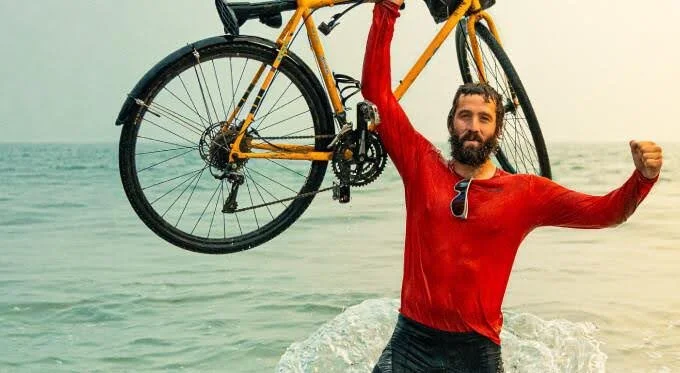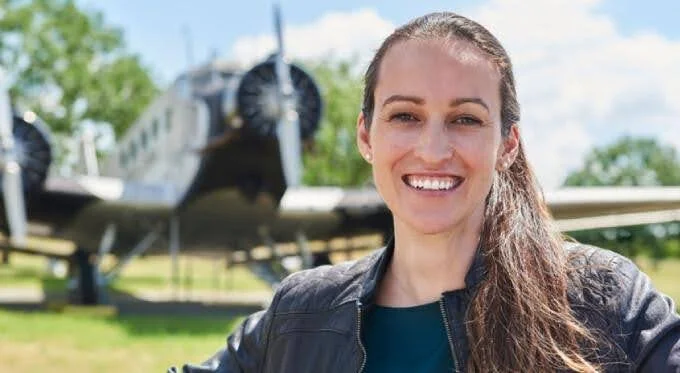How Mitch Hutchcraft went from extreme challenges to inspiring the business world
Mitch Hutchcraft has built his reputation on conquering some of the toughest challenges on Earth - from cycling 12,000 km across continents to rowing 5,000 km across the Atlantic.
He even made history as the only person to climb Mount Everest and swim the English Channel within the same 12 months.
An adventurer and exploration speaker, Mitch shows audiences that extraordinary feats aren’t reserved for the superhuman.
His message is rooted in resilience, mindset, and finding strength in adversity, helping people see obstacles as opportunities for growth.
In this exclusive interview with The Motivational Speakers Agency, Mitch explains how lessons learned from mountains and oceans apply directly to boardrooms and businesses. He shares the mental tools that fuel his success and the power of relentless positivity to overcome life’s toughest tests.
Q: You’ve completed some of the toughest expeditions on Earth. What do you believe are the most valuable lessons that businesses and professionals can take from those experiences?
Mitchell Hutchcraft: “Um, so the main thing is how to practically apply like kind of survival and life skills, because everything that keeps you going, keeps you alive, keeps you motivated in the harshest environments on the planet can be directly used by companies.
“You know, um, one big example is one of the main kind of topics of my talks is, you know, compartmentalisation. You know, that's a massive one. Any business, any person - you wake up in the morning, you know, don't think about anything apart from just, right, I’m getting my coffee.
“And, uh, people, when you think of businesses, it doesn’t matter if it’s a CEO or if it’s an employee, you think of the big picture, you think of Monday morning, you think, I’ve got a whole week at work. It becomes massively overwhelming.
“Same as me - like literally halfway across the Channel, I still knew I had 13,000km in front of me and I was going to Everest by my own power.
“The only way you get through things, exactly the same as businesses, is to think one minute at a time. When I was cycling across the world, I never thought past 20 minutes. Every 20 minutes I’d stop, shake my legs off, stretch, get back on. So I never had to think more than 20 minutes.
“So it’s just talking about compartmentalisation, using techniques and using extreme examples I’ve used, but it’s the exact same for people there. It’s just getting people to relate to me and to them. And it’s the exact same. If I thought about Everest when I was still in England, knowing I still had 19 countries ahead of me, it would just become so overwhelming. So overwhelming.
“And it’s, yeah, using that. So, yeah, compartmentalisation. Um, just in general, like the main focus of the talk in general, and which is directly linked to that, is how to channel adversity into power and not weakness. That’s the main thing.
“Everyone will get distractions at work. You lose a loved one. You have a conscious choice, which is a small change in mindset, to change that grief - instead of negativity, it can become literally pure power. It can just light a fire inside you that will make you unstoppable.
“And that’s the same in the workplace and it’s the same on any mountain, on any ocean, anything. You know, if you’re aspiring to get somewhere, you know, you can either mope around in the office or you can think, they’d want me to do well, they’d want me to be proud, so I’m going to work hard.
“So it’s kind of getting that across: channelling adversity into power, compartmentalisation, cheerfulness in the face of adversity. That’s the main one - it’s being able to, whenever things get massively tough, again, whether you’re in the office or whether you’re on a mountain, it’s being able to just take your brain away, think, this doesn’t last forever.
YOU MAY ALSO LIKE: Adriana Brownlee: Youngest woman to conquer fourteen peaks on drive and determination
“So, the other thing is again using examples about how pain is temporary. “Pain is temporary” is another topic that I talk about a lot.
“No matter how bad something is, no matter how long a week is, it’s absolutely fine because as long as you always tell yourself it’s going to end. Doesn’t matter if it’s the end of the day, the end of the week, the end of the year.
“The only time you’ve got to really, the only excuse you have to be like down in the dunks is if it was never going to end. It doesn’t matter. You just tell yourself, it’s a day, it’s a week, it’s a month. I will be at home having a cup of tea at some point by having relentless positivity.
“That’s probably the main one I say. That’s another topic - relentless positivity. Not allowing negativity into your thought process. I talk about the 40% rule, and it applies as much physically, mentally and emotionally in a workplace as it does physically.
“You know, so when you think you’re at your absolute max capacity, whether that be workload or physically, mentally, they can adopt that mindset - right, I’ve actually got a lot more to give.
“It’s the ability to take a breath, look around you, and realise, you know, no matter how stressed you are, I’m not dead. I’m going to be okay. It’s okay to be uncomfortable. That’s a mindset which everyone can apply - when things get hard, just getting comfortable being uncomfortable. Because if you adopt that mindset, then when things do get bad, you’re used to being uncomfortable.
“Same stuff directly brought over from military training and Marines training is teaching people that that’s natural, that’s good. Don’t be afraid of being uncomfortable. The human body, the human mind is not meant to be sat at home cosy, no stress.”
READ MORE: From fighter jets to space dreams: Nicola Winter on building mental resilience
Q: You made history by completing the longest climb of Mount Everest. What kind of mindset does it take to achieve something on that scale?
Mitchell Hutchcraft: “Relentless positivity. That’s probably the main one I say. That’s another topic - relentless positivity. Not allowing negativity into your thought process.
“I talk about the 40% rule, and it applies as much physically, mentally and emotionally in a workplace as it does physically.
“You know, so when you think you’re at your absolute max capacity, whether that be workload or physically, mentally, they can adopt that mindset - right, I’ve actually got a lot more to give.
“It’s the ability to take a breath, look around you, and realise, you know, no matter how stressed you are, I’m not dead.
“I’m going to be okay. It’s okay to be uncomfortable. That’s a mindset which everyone can apply - when things get hard, just getting comfortable being uncomfortable. Because if you adopt that mindset, then when things do get bad, you’re used to being uncomfortable.
“Same stuff directly brought over from military training and Marines training is teaching people that that’s natural, that’s good. Don’t be afraid of being uncomfortable. The human body, the human mind is not meant to be sat at home cosy, no stress.”
Q: Extreme challenges often push the mind as much as the body. What mental tools have helped you keep going when the odds were against you?
Mitchell Hutchcraft: “The main things they can use, um, and how they can deal with it, is to just literally take a minute, step away, close your eyes, take a deep breath. A person’s strategic ability to manage pain - easy as that. A person’s mental strategic way of dealing with pain.
“And it’s completely - the whole what I would like to drum into people and companies, you know, is it’s completely different for every person. So all it is, is taking a breath. The way I get through it and the way it directly can apply is you just close your eyes, like when things got tough ten hours into the Channel, exactly the same as in seven, you just remember why you’re there, or you just remember who you’re doing it for.
“You remember why you’re there, you remember… all you do is, and there’s so many channels. You flick through the channels, yeah. So everyone’s got their channels - channels of resilience. For me, it’s my dad dying when I was a kid. But most people will be able to, in the workplace, associate with that because many people have lost a mum, brother, granddad, whatever.
“And it’s, yeah, talking about how they can use that, like we spoke about, to turn that into a positive and power rather than a negative. So you’ve got, yeah. So the reason you’re there - family, friends - they haven’t got to be dead either, you know, you’ve got kids. Main one for most people is making them proud, giving them a good life. You know, just remember why you’re there. Flip through these channels.
“After that, it might be - for me, it was like the charity I’m raising money for. It was knowing my friends and that were proud, knowing that I’m inspiring people. So it’s like four or five channels that I have.
“And when you wear out one, you just literally flick to the next channel, flick to the next channel. And then when you’ve gone through them all, you just go back to the start. And then, by the time you’ve done that, it’s over.”
This exclusive interview with Mitchell Hutchcraft was conducted by Chris Tompkins of The Champions Speakers Agency.
READ NEXT: What leading teams on the edge of the world taught Ann Daniels about true resilience



